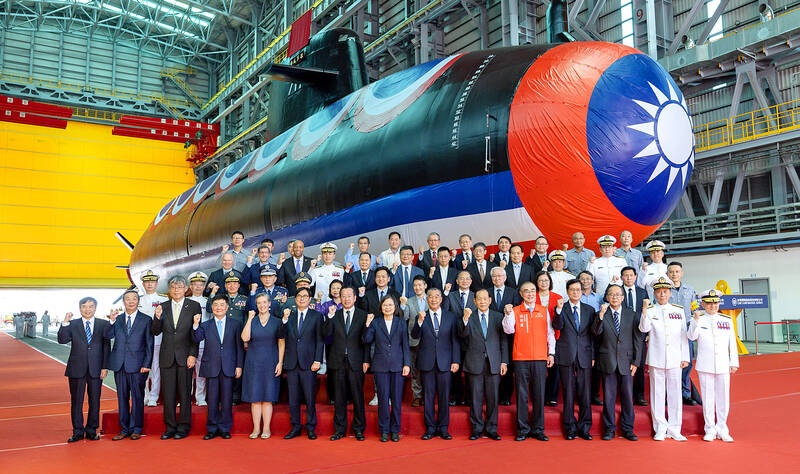The Hai Kun (海鯤), or “Narwhal,” Taiwan’s first indigenous defense submarine, is undergoing harbor acceptance tests and is expected to begin sea acceptance tests late next month at the earliest, a military source said.
Production of Hai Kun-class hulls would be done in batches of three, two and three, the source said, adding that the nation’s two Chien Lun-class submarines would remain in service after being upgraded.
This would give the navy a fleet of 10 attack submarines, which would be a “potent deterrence force against the growing threat of the [Chinese] People’s Liberation Army Navy’s submarines and surface vessels,” the source said.

Photo courtesy of the Presidential Office via EPA-EFE
The Hai Kun is armed with 18 MK-48 Mod 6 Advanced Technology (AT) heavyweight torpedoes and has the capability to launch other kinds of missiles, with foreign-manufactured weapons being the most likely choice, they said.
Building the rest of the fleet and acquiring missiles are to be carried out concurrently with funds that are to be allocated, they said.
The US-made MK-48 torpedoes are a significant improvement over Taiwan’s aging SUT 264 torpedoes, having greater range, speed, and guidance and noise reduction capabilities, in addition to being readily available as a frontline weapon still in mass production, the source said.
Institute of National Defense and Security Research fellow Su Tzu-yun (蘇紫雲) said that eight new vessels should be the bare minimum, as the ideal fleet size is double that number.
Navies typically deploy one submarine for every two in reserve, of which one is for training while the other is maintained and repaired, Su said.
This means that three subs would be active at a time, which is the minimum required for a suitable defense, he said, adding that six would meet strategic requirements more fully.
The Democratic Progressive Party government should be able to secure defense funding without a legislative majority, as Taiwan People’s Party Chairman Ko Wen-je (柯文哲) — whose party won a decisive minority in the new legislature — has professed support for spending 3 percent of the nation’s GDP on the military, Su said.
The Hai Kun’s launch showed that Taiwan can meet most of the requirements to produce submarines, although some key technologies were obtained from foreign partners, said Ko Yung-sen (柯永森), an institute fellow who is a retired army major general.
Building eight Hai Kun-class attack submarines is necessary to give the navy the capability to conduct simultaneous single-vessel patrols in the Miyako Strait and waters southwest of Taiwan proper, he said.

Alain Robert, known as the "French Spider-Man," praised Alex Honnold as exceptionally well-prepared after the US climber completed a free solo ascent of Taipei 101 yesterday. Robert said Honnold's ascent of the 508m-tall skyscraper in just more than one-and-a-half hours without using safety ropes or equipment was a remarkable achievement. "This is my life," he said in an interview conducted in French, adding that he liked the feeling of being "on the edge of danger." The 63-year-old Frenchman climbed Taipei 101 using ropes in December 2004, taking about four hours to reach the top. On a one-to-10 scale of difficulty, Robert said Taipei 101

Nipah virus infection is to be officially listed as a category 5 notifiable infectious disease in Taiwan in March, while clinical treatment guidelines are being formulated, the Centers for Disease Control (CDC) said yesterday. With Nipah infections being reported in other countries and considering its relatively high fatality rate, the centers on Jan. 16 announced that it would be listed as a notifiable infectious disease to bolster the nation’s systematic early warning system and increase public awareness, the CDC said. Bangladesh reported four fatal cases last year in separate districts, with three linked to raw date palm sap consumption, CDC Epidemic Intelligence

Two Taiwanese prosecutors were questioned by Chinese security personnel at their hotel during a trip to China’s Henan Province this month, the Mainland Affairs Council (MAC) said yesterday. The officers had personal information on the prosecutors, including “when they were assigned to their posts, their work locations and job titles,” MAC Deputy Minister and spokesman Liang Wen-chieh (梁文傑) said. On top of asking about their agencies and positions, the officers also questioned the prosecutors about the Cross-Strait Joint Crime-Fighting and Judicial Mutual Assistance Agreement, a pact that serves as the framework for Taiwan-China cooperation on combating crime and providing judicial assistance, Liang

US climber Alex Honnold left Taiwan this morning a day after completing a free-solo ascent of Taipei 101, a feat that drew cheers from onlookers and gained widespread international attention. Honnold yesterday scaled the 101-story skyscraper without a rope or safety harness. The climb — the highest urban free-solo ascent ever attempted — took just more than 90 minutes and was streamed live on Netflix. It was covered by major international news outlets including CNN, the New York Times, the Guardian and the Wall Street Journal. As Honnold prepared to leave Taiwan today, he attracted a crowd when he and his wife, Sanni,